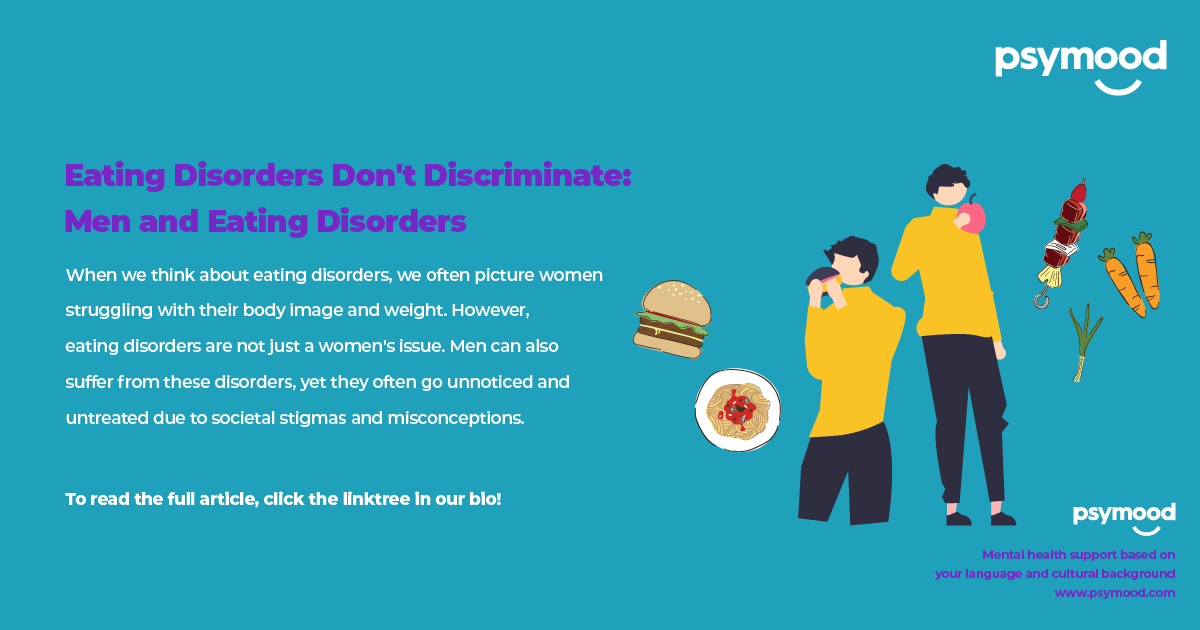Eating Disorders Don't Discriminate: Men and Eating Disorders
When we think about eating disorders, we often picture women struggling with their body image and weight. However, eating disorders are not just a women’s issue. Men can also suffer from these disorders, yet they often go unnoticed and untreated due to societal stigmas and misconceptions.
In this blog post, we will shed light on the prevalence and unique challenges of eating disorders in men. We’ll explore the different types of eating disorders that affect men, the potential causes and risk factors, and the available treatment options. By raising awareness about this often-overlooked issue, we hope to encourage more men to seek help and find the support they need to recover from their eating disorder.
Men and Eating Disorders
Eating disorders (EDs) in men often go undiagnosed or untreated because of the perception that they are a female problem. But, the fact is that EDs do affect men, actually a whopping 25% of patients diagnosed with an ED are men. Moreover, men with eating disorders may have a higher mortality risk than women. Despite all this, men are often forgotten or disregarded when talking about EDs.
What Kind of Eating Disorders Affect Men?
There are several types of eating disorders that can impact men, but the two most common are:
Binge Eating Disorder (BED): This disorder is characterized by recurring episodes of eating large amounts of food in a short period of time and feeling a loss of control over eating during these episodes. Men with BED may also experience feelings of guilt or shame about their eating habits.
Muscle Dysmorphia: Also known as “bigorexia” or “reverse anorexia,” muscle dysmorphia is a type of body dysmorphic disorder where an individual becomes obsessed with the idea that their body is too small or insufficiently muscular, despite often being well-built. Men with muscle dysmorphia may engage in excessive exercise, use steroids, or follow strict diets to achieve their desired body image.
While anorexia and bulimia are less common in men than in women, they can still occur. Anorexia involves an intense fear of gaining weight and a distorted body image, leading to severe calorie restriction, while bulimia involves cycles of binge eating followed by purging through vomiting or the use of laxatives.
What Causes Eating Disorders in Men?
Just like women, men can also be impacted by media and societal expectations to look a certain way. Men are often exposed to societal pressures to conform to a certain body image, such as being tall, muscular, and fit. This pressure can lead to low self-esteem, anxiety, depression, and perfectionism. These factors may contribute to the development of an eating disorder.
How Can We Support Men with Eating Disorders?
Supporting men with eating disorders requires a multifaceted approach that addresses both the physical and emotional aspects of the disorder. We need to break the stigma of men having to look a certain way to be accepted in society. We also need to acknowledge that EDs in men is a real problem that needs to be addressed and treated the same way we do for women.
If you know someone who is suffering from an ED, encourage them to seek professional help. EDs are serious mental health conditions that require professional treatment. It is also important to provide emotional support. Men with EDs may feel ashamed or embarrassed about their condition. Let them know that you are there to support them, and offer a listening ear without judgment. And Lastly, Avoid making comments about their appearance, weight, or eating habits. Instead, focus on their overall well-being and support their recovery efforts. It is key to create an environment that is supportive of recovery and free of triggers, such as unhealthy food choices or negative body talk.
The Whale, a Movie that looks into Eating Disorders in Males
Darren Aronofsky’s, The Whale, starring Brendan Fraser, follows an English teacher suffering from congestive heart failure due to a lifetime of struggle with binge eating. While the movie received lots of criticism from people who suffer from binge eating disorders in real life, it sheds light on the dark reality of eating disorders and how it can take over the lives of the sufferers.
PsyMood is a digital tool designed to help you find the support you need in the language that you are most comfortable with. PsyMood considers cultural background, geographical location, interests, and personal needs, amongst other factors, to pair you with service providers for either online or in-person therapy sessions.


.png)
.png)
.png)
Recent Comments